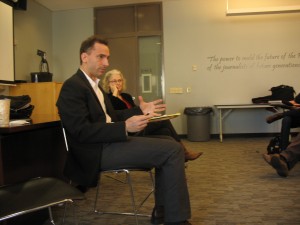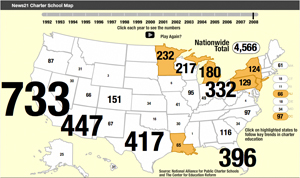Journalist Paul Tough Speaks to Covering Education Seminar from Maura Walz on Vimeo.
By ELAINE MEYER
Paul Tough is fast becoming one of the most prominent voices on the future of American education, and he does not even consider himself an education journalist. Tough, author of “Whatever it Takes: Geoffrey Canada’s Quest to Change Harlem and America,” stopped by the Columbia School of Journalism’s Covering Education class Monday, as he has for the last three years, to talk about an educational experiment that he believes has worked and that now may be tried in other parts of the country.
This experiment is called the Harlem Children’s Zone, a group of schools

founded by social activist Geoffrey Canada that focuses on a child from before birth to high school graduation. Tough spent time at all of the schools that comprise the Zone for five years, ending in 2007, to see the first students who entered the Zone score at grade level and above the New York City average on their math and reading tests, a rarity in Harlem.
Today Tough is touring the country, sometimes with Canada, to report that the Harlem Children’s Zone model is a success. He has a powerful audience. Barack Obama visited in 2007 and wants to create 20 “Promise Neighborhoods” modeled after the Harlem Children’s Zone.
Tough said he is an unintentional education reporter. He initially got interested in writing about the Harlem Children’s Zone not because of its implications for future education policy but because of its ambitious approach to redressing the disadvantages of poverty. He said his joint touring with Canada might be problematic if he were a daily education reporter but said he maintained a degree of skepticism toward the school while reporting on it that was at times too healthy.
“I tried hard in the actual writing of the book not to be too hard of a champion.”
One of the most humbling moments for Tough came as he sat in the classroom of the charter middle school one day and realized how hard students were working to prove the school was a success.
“There was something about the unfairness of the situation that really struck me,” said Tough, who was educated at progressive schools in Toronto. “When I was in middle school, I was able to be rebellious, to take assignments and change them.
“It made me admire them as well that their level of self-discipline in middle school and high school was so much higher than mine. I could goof off and had this safety net.”













